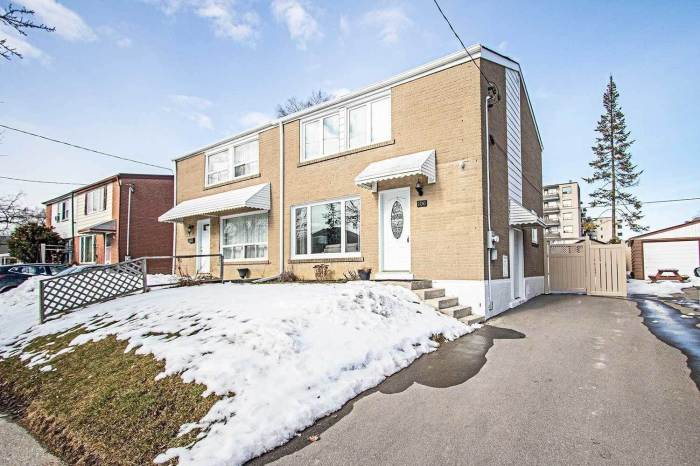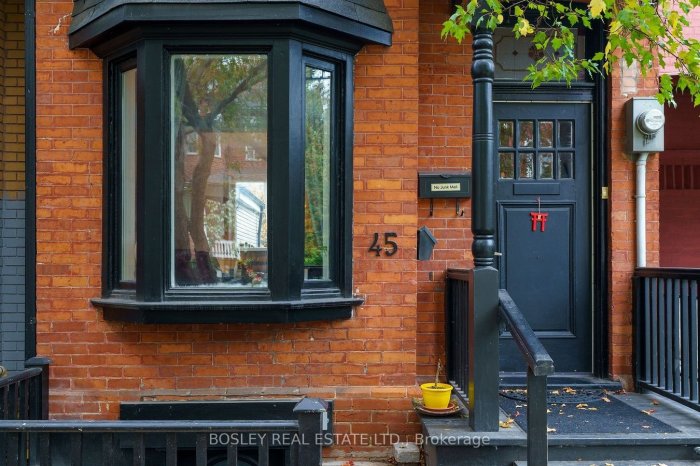House for Rent Toronto Your Guide
Toronto House Rental Market: A Comprehensive Guide
House for rent toronto – Finding the perfect house for rent in Toronto can be a rewarding yet challenging experience. This guide provides a detailed overview of the Toronto rental market, covering various aspects to help you navigate the process successfully. We’ll explore current market trends, different house types, effective search strategies, cost factors, tenant rights, and neighborhood insights to empower you in your rental journey.
Rental Market Overview in Toronto, House for rent toronto

Source: point2.com
The Toronto rental market for houses is highly competitive, characterized by fluctuating prices and diverse housing options. Demand consistently outpaces supply, particularly in desirable neighborhoods. Three key factors influencing rental prices include proximity to downtown, access to public transportation, and the quality of schools within the area. Downtown Toronto offers a vibrant urban lifestyle with high rental costs, while the suburbs provide more space and tranquility at generally lower prices, though commuting times increase.
Typical rental terms involve one-year leases, with options for renewal, and include clauses outlining tenant responsibilities, rent payment schedules, and notice periods. Landlords often require first and last month’s rent, along with a credit and background check.
Types of Houses for Rent in Toronto
Toronto offers a variety of house types catering to diverse preferences and budgets. Detached houses provide complete privacy and yard space, while semi-detached homes offer a balance between privacy and affordability. Townhouses, often part of a larger complex, feature shared amenities and less maintenance. Condominiums, often found in high-rise buildings, offer modern amenities and a convenient urban location. Each house type has its own appeal and comes with unique features and amenities.
| Type | Common Features | Typical Price Range (CAD/month) | Neighborhood Examples |
|---|---|---|---|
| Detached House | Private yard, garage, multiple bedrooms and bathrooms | $4,000 – $10,000+ | Rosedale, Forest Hill, Leaside |
| Semi-Detached House | Shared wall, private yard (often smaller than detached), multiple bedrooms | $3,000 – $7,000 | High Park, Annex, Junction |
| Townhouse | Shared walls, often with private entrance, less yard space, shared amenities (sometimes) | $2,500 – $5,000 | Midtown, Beaches, Yorkville |
| Condominium | Shared amenities (gym, pool, concierge), secure building, often less yard space | $2,000 – $6,000+ | Downtown Core, Yorkville, Liberty Village |
Finding a House for Rent in Toronto
Several online platforms and resources facilitate the search for rental properties in Toronto. Websites like Kijiji, Rentals.ca, and Viewit offer extensive listings, while real estate agencies provide personalized services. Each platform has its strengths and weaknesses; some offer broader reach while others specialize in specific property types or neighborhoods. The application process generally involves submitting a rental application, providing references, and undergoing a credit and background check.
Landlords often prioritize applicants with strong financial stability and a positive rental history.
- Identify your needs and budget.
- Search online platforms and real estate agencies.
- View properties and shortlist potential options.
- Complete rental application forms.
- Provide references and undergo background checks.
- Negotiate lease terms and sign the agreement.
Factors Affecting Rental Costs

Source: rentals.ca
Rental costs in Toronto are influenced by several factors. Location is paramount; houses in central neighborhoods command higher prices due to their convenience and amenities. Size and number of bedrooms and bathrooms significantly impact rental costs. Modern amenities, such as updated kitchens and bathrooms, and the overall condition of the property also affect pricing.
| Neighborhood | Average Monthly Rent (CAD) – Detached | Average Monthly Rent (CAD) – Semi-Detached | Average Monthly Rent (CAD) – Townhouse |
|---|---|---|---|
| Downtown Core | $8,000+ | $5,500+ | $4,000+ |
| Midtown | $6,000+ | $4,000+ | $3,000+ |
| North York | $5,000+ | $3,500+ | $2,500+ |
| Scarborough | $4,000+ | $3,000+ | $2,000+ |
Seasonal changes can also influence rental prices; demand might be higher during peak moving seasons (summer and fall). For instance, a 2000 sq ft detached house in the Annex, with updated kitchen, close to public transport, could cost significantly more than a similar-sized house in Scarborough with fewer amenities.
Tenant Rights and Responsibilities
Tenants in Toronto have specific rights and responsibilities under the Residential Tenancies Act. These include the right to quiet enjoyment of the property, the right to be free from harassment, and the right to repair requests. Responsibilities include paying rent on time, maintaining the property in good condition, and adhering to the terms of the lease agreement. Common issues include repairs, rent increases, and evictions.
The Landlord and Tenant Board (LTB) resolves disputes between landlords and tenants.
- Review the lease agreement carefully.
- Document all communication with the landlord.
- Understand your rights and responsibilities.
- Address issues promptly and professionally.
Neighborhood Guides for Renters

Source: bwbx.io
Three diverse Toronto neighborhoods popular for renting houses are:
- The Annex: Known for its charming Victorian architecture, proximity to the University of Toronto, and vibrant cultural scene. Rental costs are high, but the neighborhood’s character and convenience are attractive to many. Expect a bustling, walkable atmosphere with tree-lined streets and a mix of old and new buildings.
- Leaside: A family-friendly neighborhood with a strong community feel, excellent schools, and lush green spaces. Rental costs are high, reflecting its desirability. Imagine wide, tree-lined streets, spacious homes with manicured lawns, and a relaxed atmosphere.
- The Beaches: A relaxed, seaside neighborhood with beautiful parks, stunning lake views, and a relaxed pace of life. Rental costs are generally lower than downtown but still competitive. Picture a laid-back community, with the sounds of waves, sandy beaches, and a casual atmosphere.
Essential Questionnaire: House For Rent Toronto
What is the average rental deposit in Toronto?
The average rental deposit is typically one month’s rent, but it can vary depending on the landlord and the property.
How long does it usually take to find a rental house in Toronto?
The search time varies greatly depending on your budget, desired location, and the current market conditions. It could range from a few weeks to several months.
What documents are typically required for a rental application?
Landlords usually require proof of income, credit reports, references, and government-issued photo ID.
What are my options if I have a dispute with my landlord?
You can contact the Landlord and Tenant Board to resolve disputes related to your rental agreement.
Can I break my lease early in Toronto?
Breaking a lease early is possible, but you might be subject to penalties depending on your lease agreement and the circumstances.




















